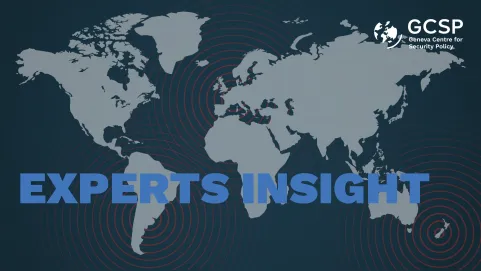Session 6: What is next? Strategic anticipation and COVID-19
Since its emergence a few weeks ago, Covid-19 has already fundamentally changed the fabric of our society and impacted the global geopolitical landscape, but in what ways?
Covid-19 Crisis: Global Crisis, Global Risk and Global Consequences is a new webinar series that examines various possible and visible consequences of the current crisis including its strategic and economic implications, impact on global governance, on gender or the role of technology.
The webinar is free and conducted in English. The first webinar session will provide an overview of the strategic, global health security, crisis management, governance, economic and financial implications of this crisis.
The magnitude of the COVID-19 pandemic caught the world off guard but was not a black swan. Pandemics have appeared in foresight reports as a potential risk on a regular basis. The 1918 influenza pandemic and more recent global health challenges, such as the SARS outbreak, have not been entirely forgotten either. However, linking foresight processes and findings into policy action remains a challenge. This includes international security where the focus is on threats and reacting to security crises can dominate at the expense of anticipatory planning. This webinar will address the value of strategic anticipation in policymaking in view of the COVID-19 pandemic and explore the future of the current crisis for international security.
Links mentioned during the webinar
Sensemaker collector on Futures of Society: https://bit.ly/FuturesofSociety
Article by Mathew Burrows and Peter Engelke (Atlantic Council): What World Post-COVID-19: Three Scenarios: https://atlanticcouncil.org/content-series/shaping-post-covid-world-together/what-world-post-covid-19-three-scenarios/
Disclaimer: The views, information and opinions expressed in this digital product are the authors’ own and do not necessarily reflect those shared by the Geneva Centre for Security Policy or its employees. The GCSP is not responsible for and may not always verify the accuracy of the information contained in the digital products.
 COVID19 Webinar Series: Global Crisis, Global Risk and Global Consequences - Session 6
">
COVID19 Webinar Series: Global Crisis, Global Risk and Global Consequences - Session 6
">
 COVID19 Webinar Series: Global Crisis, Global Risk and Global Consequences - Session 6
">
COVID19 Webinar Series: Global Crisis, Global Risk and Global Consequences - Session 6
">
 COVID19 Webinar Series: Global Crisis, Global Risk and Global Consequences - Session 6
">
COVID19 Webinar Series: Global Crisis, Global Risk and Global Consequences - Session 6
">
 COVID19 Webinar Series: Global Crisis, Global Risk and Global Consequences - Session 6
">
COVID19 Webinar Series: Global Crisis, Global Risk and Global Consequences - Session 6
">
 COVID19 Webinar Series: Global Crisis, Global Risk and Global Consequences - Session 6
">
COVID19 Webinar Series: Global Crisis, Global Risk and Global Consequences - Session 6
">
 COVID19 Webinar Series: Global Crisis, Global Risk and Global Consequences - Session 6
">
COVID19 Webinar Series: Global Crisis, Global Risk and Global Consequences - Session 6
">
 COVID19 Webinar Series: Global Crisis, Global Risk and Global Consequences - Session 6
">
COVID19 Webinar Series: Global Crisis, Global Risk and Global Consequences - Session 6
">
 COVID19 Webinar Series: Global Crisis, Global Risk and Global Consequences - Session 6
">
COVID19 Webinar Series: Global Crisis, Global Risk and Global Consequences - Session 6
">
 COVID19 Webinar Series: Global Crisis, Global Risk and Global Consequences - Session 6
">
COVID19 Webinar Series: Global Crisis, Global Risk and Global Consequences - Session 6
">
